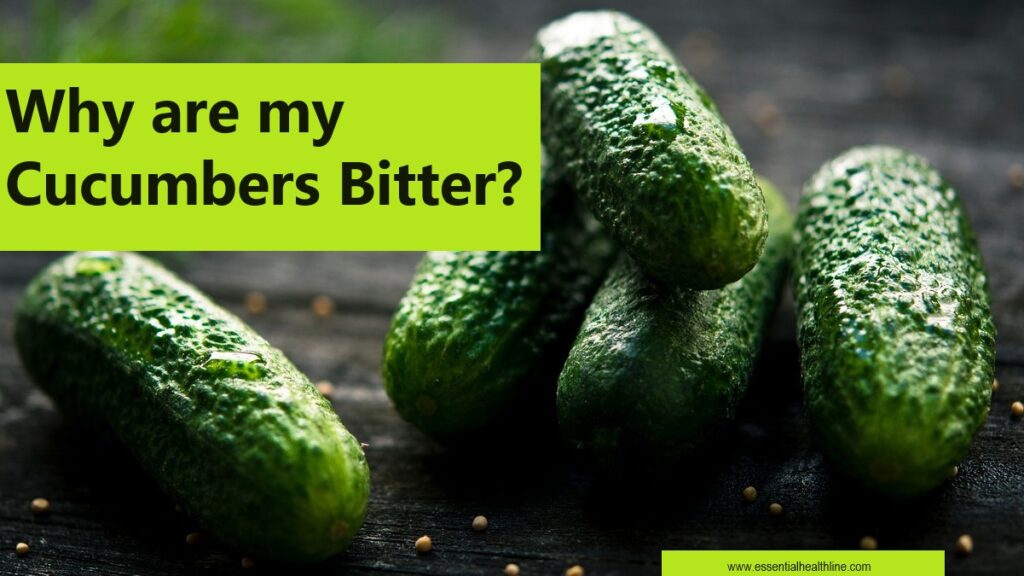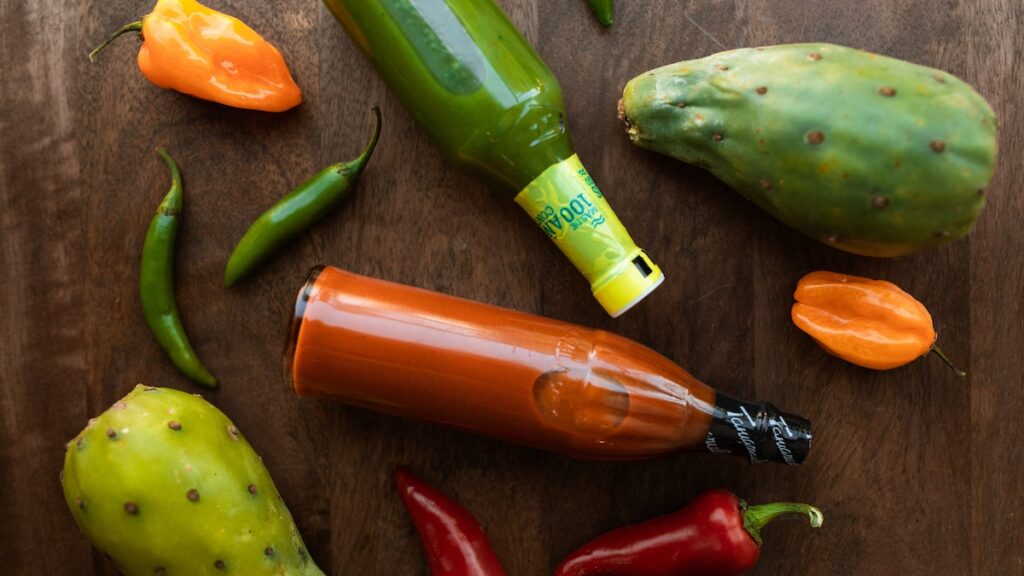Cucumbers or Cucumis sativus are members of the Cucurbit family and are a healthy addition to your diet. They’re favorable to your gut. You can include the crunchy and refreshing fruit in your favorite dishes or enjoy it alone. While it may have an awkward taste, you may wonder, is bitter cucumber safe to eat?
Bitter cucumbers are safe to eat if their bitterness is at a low degree. Don’t consume if your cucumber is severely bitter and almost inedible. It could cause digestive system discomfort due to large amounts of the bitterness-causing compound (cucurbitacin).
This article explains how to identify bitter cucumbers, what makes them bitter, and how to fix the matter and safely consume them. Let’s get started.
Is Bitter Cucumber Safe to Eat?
Yes, bitter cucumbers, also known as citrus colocynthis, desert gourd, or bitter apple, are harmless if they have mild bitterness. Discard the almost inedible and severely bitter ones. Otherwise, you may develop indigestion issues due to increased bitterness caused by the high levels of cucurbitacin.
Most cucumber types have low cucurbitacin levels and are safe to eat in moderation. Hence, selecting cucumbers with low bitterness, grown for their low cucurbitacin concentration is a good idea. You’ll find such in grocery stores.
Also, if your cucumber is mildly bitter, check the extent of the spreading. Much cucurbitacin concentrates around the stem end, which you cut off. A small cucurbitacin amount benefits your body due to its diuretic properties.
What Is Cucurbitacin?
Cucurbitacin is a plant-produced substance that naturally defends a plant against herbivores and pests. The compound’s bitter taste keeps off potential consumers. Unfortunately, severe bitterness is health-threatening to humans.
The compound level is high in stressed plants, occupying the cucumber leaves, stems, and roots. Small amounts of desert gourd offer potential health benefits due to the cucurbitacin’s antimicrobial, anti-inflammatory, and anti-cancer properties.
Consume bred, fully ripe, and well-prepared cucumbers, as they have low cucurbitacin content.
Below is how to prepare the vegetables correctly:
- Clean them properly.
- Peel towards the stalk.
- Cut the stem ends generously.
Also, minimizing bitterness before consuming the bitter fruit eliminates the risk of cucurbitacin poisoning.
How Do You Identify a Bitter Cucumber?
Look for the following signs to identify a bitter cucumber:
- Bitter flavor: Taste a small piece of the cucumber fruit to assess its edibility
- Bitter aftertaste: Pause a little after tasting to feel if a bitter flavor develops after a short while.
- Discoloration: A bitter cucumber has a brownish or yellowish color.
- Unusual texture: Desert gourds have a mushy or softer texture.
How Do You Remove Bitterness of Cucumber?
- Rub the edges
- Add vinegar/lemon juice
- Add salt
- Run a fork on the cucumber
- Peel the skin
Rubbing the Edges
Cut the ends of the cucumber and rub them circularly. The oozing white foam from the edges is the bitter compound. Slice the cucumber and rub the tip again to check for more cucurbitacin. Enjoy the remaining piece if no more foam oozes.
Adding Lemon Juice or Vinegar
Sprinkling lemon juice or vinegar on sliced cucumbers and leaving them for about 10 minutes neutralizes the bitterness. Rinse the pieces thoroughly and enjoy the crunchy and refreshing fruit.
Adding Salt
Salt works similarly with lemon juice and vinegar. Cut the cucumber into half and sprinkle some salt on the edges. Leave them for about 30 minutes and rinse in cold water. Slice your cucumbers and consume them as desired.
Running a Fork on the Cucumber
Cut the edges of your cucumber and peel it. Run the sharp edges of the folk around it at least two times. The process releases the chemicals, removing bitterness from the cucumber. Clean and consume your fruit.
Peeling the Skin
The bitterness-causing compound occupies the cucumber plant’s skin, leaves, stems, and roots. Hence, peeling a bitter cuke before eating reduces the severity of the poisoning.
Does Cooking Bitter Cucumbers Make Them Safe to Eat?
Yes, cooking bitter cucumbers makes them safe to eat. The process reduces bitterness, and you can do so in three methods:
Stir-frying:
- Slice your cucumber, or cut small pieces.
- Heat oil on a pan and add the slices or pieces.
- Stir them until they soften.
- Add spices and seasoning to enhance flavor.
- Serve as a side dish or part of the main dish.
Boiling:
- Cut your cucumber into small pieces or slices.
- Boil some water, and add the slices or pieces.
- Boil them until they become tender.
- Drain the water and add your preferred seasoning.
- Add them to soup, salads, or stews.
Pickling:
- Prepare your cucumber slices or pieces.
- Add sugar, salt, vinegar, and spices in a container.
- Leave them to soak in the solution overnight or for several hours.
- Eat them as they are, or add them to salads or sandwiches.
Although cooked bitter cucumbers are edible, they have a slight bitterness. Consult a health professional if you’re a first-time consumer, especially if you’re under medication or you have a health condition.
Bitter Cucumbers Safe Consumption Tips
Below are guidelines for handling and consuming bitter cucumbers without risking cucurbitacin poisoning:
- Get bitter homegrown cucumbers or buy from reputable suppliers.
- Use clean water to wash them thoroughly to remove contaminants and dirt.
- Slice or cut them into pieces and remove the seeds.
- Cook them properly: Boiling, stir-frying, or pickling.
- Serve your cooked cucumbers moderately with a balanced meal.
What Influences Bitterness Levels in a Cucumber?
Here are the various factors that influence bitterness levels in a cucumber.
Environmental Factors
High temperatures and inadequate watering support cucurbitacin production. High or low heat levels and uneven watering stress the plant over time, increasing the fruits’ bitterness.
Remedy: Use shade cloths to protect your cucumbers from high heat and floating row covers during low temperatures. Mulching (a 2-inch-thick layer of shredded bark, straw, or grass clippings) is appropriate for soil moisture and temperature regulation, especially during dry weather. Also, provides consistent soil moisture (at least one inch of water deep per week). Drip irrigation is perfect for ensuring even watering.
Harvest Timing
Mature and overripe cucumbers are severely bitter; they naturally produce more compound cucurbitacin as they mature. A good cucumber is firm, evenly colored, and without over-ripeness signs like yellowing.
Remedy: Harvest your cucumbers correctly (as soon as a fruit matures) to prevent excess bitterness. Pick them daily once the plant starts producing fruits, depending on vine or bush, slicing, or pickling.
Nutrients Deficiency
Cucumbers feed heavily to yield good results. Insufficient nutrient (especially potassium) supply is the other cause of heightened bitterness in cucumbers.
Remedy: Add compost posts or other organic matter to boost soil fertility when planting. Additionally, side dress or add a balanced fertilizer with a 10-10-10 or 20-20-20 ratio during the growing season. Use drip irrigation and deep soaking to ensure adequate water and nutrient supply. Keep beds weed-free so the cucumber plants benefit from all the nutrients.
Genetic Composition
A cucumber plant’s genetics determine the severity of bitterness it carries. Some cucumber varieties, like heirloom and wild cucumbers, have higher levels of cucurbitacin, resulting in more bitterness. Usually, thick-skinned ones are more prone to bitterness than others. Also, the chemical’s level is higher in older seeds, leading to a higher risk of bitterness.
Remedy: Choose seeds with ‘bitter-free,’ ‘mild,’ ‘burpless,’ and ‘sweet’ labels. Use fresh, high-quality cucumber seeds from reputable sources.
Preparation Method
How you handle and serve cucumbers matters. Cucumbers with skin are more bitter than those without since cucurbitacin concentration is high on the skin. The stem end of cucumber, too, has a large amount of cucurbitacin. Additionally, the fruit’s seeds contribute to the bitterness.
Remedy: Remove the cucumber skin, seeds, and the stem end of the fruit before cooking. Taste a piece to assess the degree of bitterness and avoid extremely bitter cucumbers in meals.
Storing Strategy
Improper storage increases cucumber bitterness. If harvested cucumbers have excessive heat exposure, they lose water, producing high cucurbitacin concentrations. Natural evaporation also increases the bitter flavor.
Remedy: Process your cucumbers quickly or store them in a fridge.
Pests Damage
Since the cucurbitacin compound is the plant’s defense strategy, a cucumber releases more if pests attack it.
Remedy: Address the pests’ issues immediately.
What Are the Health Implications of Eating Bitter Cucumbers?
Bitter cucumbers have positive and negative health implications, as outlined below:
Positive:
- Supplying nutrients such as potassium and iron
- Boosting the immune system
- Reducing inflammations
- Lowering blood sugar
- Improving digestion
Negative:
- Hypoglycemia (low blood sugar)
- Gastrointestinal discomfort
- Drug interactions
- Allergic reactions
Wrapping Up
A bitter cucumber is safe to eat if the flavor is mild. A small amount of the bitterness-causing compound (cucurbitacin) has various health benefits due to its diuretic effects. On the other hand, a severely bitter cucumber is toxic and causes various health complications.
Several factors influence the degree of bitterness, including extreme temperature, lack of water, nutrient deficiency, genetics, and pest infestation. The other main reasons include poor harvest timing, preparation methods, and storing strategy.
You can safely enjoy bitter cucumbers by following this article’s bitterness-reducing tactics and proper cooking methods. Try them today and reap maximum benefits!



